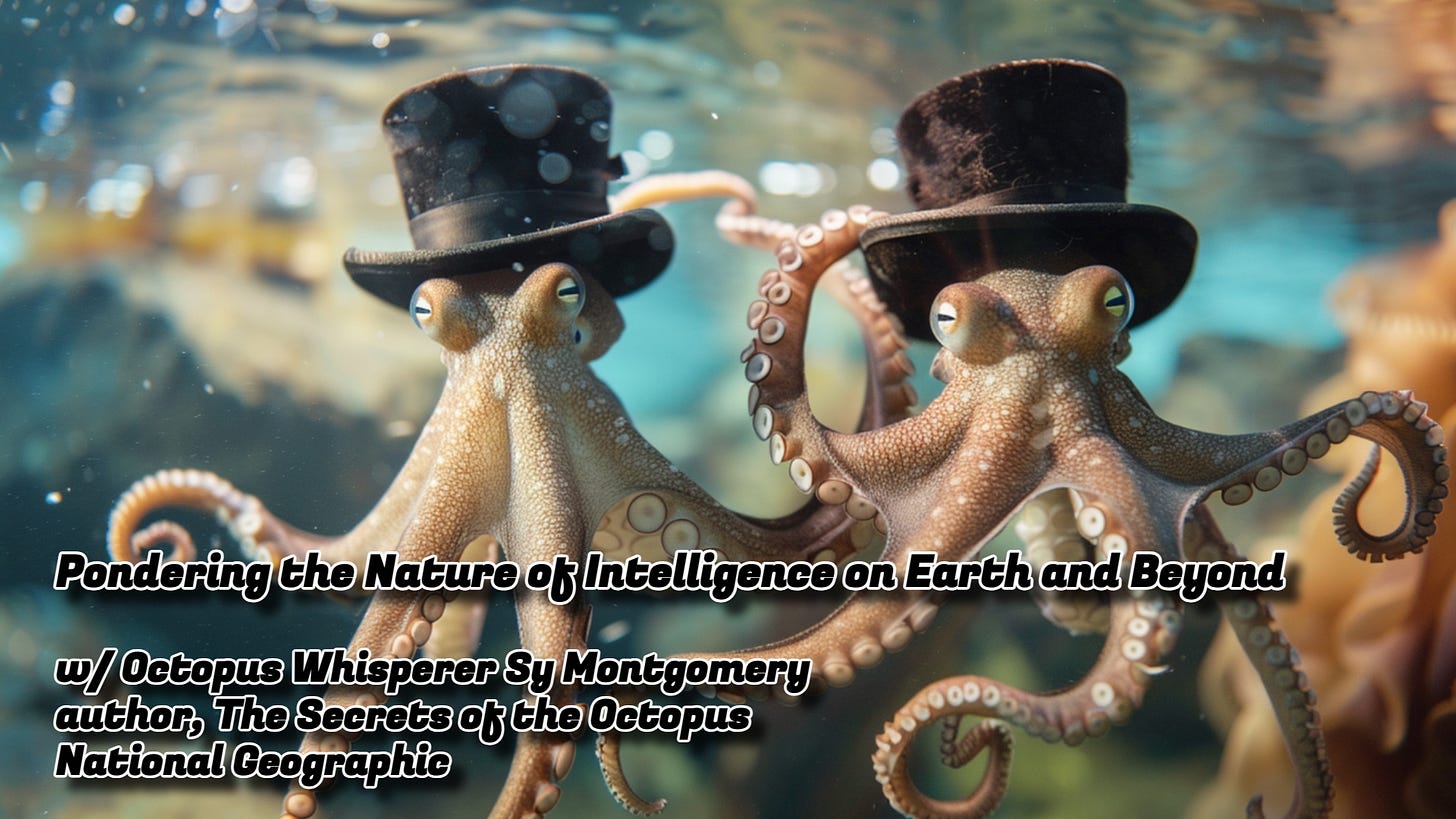Hello everyone!
Welcome back to The Cosmic Companion! I'm your friendly inter-dimensional host, James G. Maynard.
Today, we're diving deep into the wild world of intelligence - from curious creatures beneath the waves to the endless expanse of space. Later in the show, we will be talking with octopus whisperer Sy Montgomery.
[OCTOPUS: What? What? Speak up! Stop whispering!]
Now, you probably think I'm about to start talking about animals. Well, yes. But. No. Not yet. First, let's explore the vast network of fungi and their surprising sentience!
MUSHROOMS!

Mycelial networks - a kind of subterranean fungal internet - reveal that intelligence isn't just for humans and animals! These underground networks exchange information between fungi, trees, and plants, solve problems, and share resources.
The infamous Humongous Fungus of Oregon's Malheur National Forest is believed to be the largest single living organism on Earth. This colossal Armillaria ostoyae spreads over an astonishing nine square kilometers (3.5 square miles), covering an area about twice the size of Midtown Manhattan!
Estimates suggest the underground mycelial networks of the Humongous Fungus may boast trillions of connections, allowing fungi and plants to communicate, cooperate, and share resources. It's basically a biological fungal-wide-web sprawling beneath our feet, connecting and nurturing life above and below ground.
Bees are another impressive example of intelligence, as these busy insects communicate with each other using a waggle dance to share information about the location of food sources.
[Stop that! Stop this right now. This is ridiculous.]
On land, we find many clever creatures, like the highly intelligent ravens and crows. These avian brainiacs have been known to use tools, remember human faces, teach their friends about dangerous humans, and even hold grudges! You do NOT want a raven holding a grudge against you!
Scene: A city park, filled with people enjoying a sunny day. In the background, a statue of Edgar Allen Poe. A raven stands on his shoulder.
[Enter Human, walking through the park, enjoying a sandwich.]
Crowstoya: My name is Ravenstoya. You gave my friends stale bread. Prepare to be annoyed.
[Crowstoya watches Human intently, then takes flight, diving towards the sandwich.]
Crowstoya: Quoth the raven, 'Give me snack!'
[Crowstoya snatches the sandwich and flies into a tree, perched victoriously with the sandwich.]
Crowstoya: Nevermore will you enjoy this sandwich!
[Crowstoya devours the sandwich as Human looks on, defeated.]
Crowstoya: Hey! Is that brown mustard?
---
And let's not forget ants! These tiny creatures can work together to solve complex problems, like building bridges and navigating mazes. It's truly remarkable how such small creatures can achieve such great feats.
Chimpanzees and gorillas, our close relatives in the primate family, are known for their intelligence, tool use, and complex social behaviors. This inter-species kinship, first brought to light through the pioneering work of Jane Goodall, revealed the incredible depth and complexity of our primate cousins.
[What clever creatures!]
Speaking of clever creatures, let's talk octopus! These underwater Einsteins challenge our assumptions about intelligence with their problem-solving skills, tool use, and eight arms full of surprises - and brains!
[BRAINSSSSS!]
Next up, we talk with renowned naturalist, author, and "Octopus Whisperer," Sy Montgomery, revealing The Secrets of the Octopus.
As our understanding of intelligence evolves, so do our creations. Artificial intelligence is on the rise, forever altering the way everything is done.
Recognizing intelligence in electronic systems is a challenge in itself. The famous Turing Test, which assesses a machine's ability to exhibit human-like intelligence, is just one example of our attempts to grapple with this question.
Artificial General Intelligence (AGI) refers to artificial systems whose general reasoning skills equals or surpasses that of a human being. Such designs would be able to learn, solve problems, and plan for the future.
Researchers have not yet developed AGI, but these systems are likely to come online in the near future.
In contrast, current AI models are considered narrow AI. These excel at specific tasks, such as driving an autonomous vehicle or playing chess, but lack the versatility and adaptability that would be intrinsic in an AGI.
Think of it this way: AGI would possess the same abilities as a human to write a poem, draw a portrait, play go, and have a conversation about astrophysics, all in the same day. The possible implications of such a development are mindboggling.
[MIND BLOWN]
Now, let's look to the stars! The search for extraterrestrial intelligence raises intriguing questions about recognizing alien smarts. Radio signals, laser transmissions, or large-scale engineering projects could all be signs of cosmic intelligence. The first step to discovering intelligent life beyond Earth is to recognize it when we see it. Evidence of extraterrestrial intelligence may surround us, but if we cannot discern those signals from background noise, knowledge we are not alone in the Universe may remain forever hidden from us.
Even once we find evidence for alien intelligence and recognize it, we must also learn how we might communicate with beings beyond our solar system. Keep in mind that each single exchange would take years or decades to complete. It's a challenge that might put our human brains to the test.
As we reflect on our own understanding of intelligence, we can't help but wonder: how would an extraterrestrial species perceive us? Would alien life consider humans intelligent? Should WE consider ourselves intelligent?
While you are pondering those questions, we are taking the next two weeks off from the show as we continue work on our upcoming feature-length films, Gaia Rising, and The Wizard and The Scholar.
Perhaps the surest sign of intelligence (and good taste) is subscribing to The Cosmic Companion! You better go ahead and do that on whichever platform you're on now. Or like. Share. Whatevs.
Clear skies!
James





















Pondering the Nature of Intelligence on Earth and Beyond w/ Octopus Whisperer Sy Montgomery